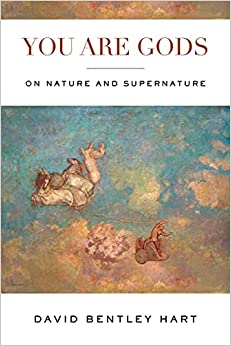Hart begins part 2 of this essay by setting out his understanding of the position of his adversary. (Again, I lack the knowledge of any independent determination of Hart’s characterization of the Thomist position.) Hart writes that when theologians separate nature and supernature (or grace) what they are saying is that “‘grace is extrinsic to the nature of the creature.'” p.5. (The modern perspective that Hart writes against might (?) be found HERE.) Hart writes that what this means is that “human nature has no inherent ordination toward real union with God, and . . . rational creatures are incapable even of conceiving a desire for such union.” p.5
Hart’s critique of grace as a superadded gift goes back to Augustine’s “restless heart” in the opening lines of The Confessions. In Augustine’s framework, grace is given by God to the natural rational Will so that a person’s Will will naturally seek God. But Hart asks the question of why should it be the case that the Will seeks to be joined to God. Why couldn’t God create a world where a person’s natural terminus is not in God but in something completely natural? In this case, our longing for God would simply be an abstract curiosity of our origins. Regardless, within this understanding “when rational natures do bear the gracious imprint of a vocation to deification, human nature in itself remains entirely identical to what human nature would have been in a world without grace.” p.6.
This deficiency in a proper understanding of our necessarily inherent divine nature, Hart argues, arises from a misapprehension of the Fall. Hart’s foils “see the Fall as humanity’s descent from a graciously elevated state (Eden) into the state of nature as God had created it in its integrity (including such essential features as suffering and death).” The traditional Christian view, Hart argues, is that “the Fall was the descent of humanity and the whole cosmos for their original and natural condition into an unnatural state of bondage and decay (including such accidental features as suffering and death).” p.6. Fundamentally, the disagreement as to nature and supernature derives from where we place “nature.” Is our “natural” state pre- or post-lapsarian? If our natural state is postlapsarian, then grace is necessary for us to even recognize our fallen condition and to desire God; but if our “natural” state is prelapsarian then our “natural” state is to desire our return to an Edenic state much as the prisoner’s desire is to return to the outside world.
Even within Hart’s argument that our natural desire is for God, grace appears to be required. First, even though something is “natural” does not necessarily mean that we are fully capable of achieving the end ourselves. Hart points out that “we are finite and contingent beings [therefore] everything ‘natural’ about us . . . is dependant upon some other source of power not only for its realization but for its very existence.” p.7. Even the most natural desires for food or sex are dependent upon something external to us. A natural end of being an adult human male is to be a husband and a father – both of which cannot be achieved on their own. The grace of cooperating external causes is required for the fulfillment of these most natural of desires. Hart writes that “there is no logical reason to claim that an end that can be achieved only through supernatural assistance is not, for that reason, a natural possibility.
Hart then goes back to the fundamental difference between himself and his adversary on the nature of the Fall – why should one assume that a wholly natural progress into deification lies beyond the capacity of an unfallen rational creature? The error lies in thinking that the desire for deification must be “either a work of grace or a work of nature, but realizes instead that such a distinction is a phantom of fallen consciousness.” p.7. Nature and Grace are not separate concepts.
Hart this section with the insight that “Finite existence itself is always already nothing but the gracious effect of God calling creatures to himself out of nothingness. All of those boring false dilemmas bedeviling Western theology since the Pelagian controversy . . . are simple categorical errors. Between the immanent and the transcendent, or the finite and the infinite, such rivalries of agency are not even cogently conceivable.” p.9

